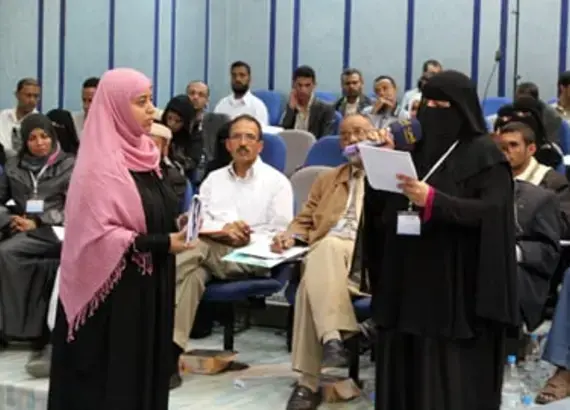
Success Story
At Live Televised Town Hall Meetings, Yemenis Can Question Leaders for the First Time
The 2011 change in Yemen’s government has brought with it a first for the country – the chance for ordinary Yemenis to publicly question their political leaders about the economy, unemployment, transitional justice and other issues on their minds.
In a series of town hall-style meetings held in October, November and December, citizens from across the country had the opportunity to discuss the country’s future with political leaders on live television, which was also a first. The gathering, organized by NDI in cooperation with the United Nations Development Programme (UNDP), convened civil society representatives, political party leaders and activists. More than 150 Yemenis representing each of the country’s 21 governorates attended the Oct. 16 meeting, while attendance exceeded 200 participants in each of the subsequent town halls.
The town halls are an integral part of a transition process initiated by the departure of the country’s longtime president, Ali Abdullah Saleh, who, upon signing the Gulf Cooperation Council Agreement on Nov. 23, ceded powers to Abdo Rabu Mansour Hadi to lead significant political, military and economic reforms. The foundations for new institutions and systems are now being laid through a two-year process that includes a National Dialogue Conference, expected at the end of next month, focused on revising the constitution before new parliamentary and/or presidential elections are held in February 2014.
In addition to their live broadcast on Yemeni television, the town hall meetings were rebroadcast on regional stations such as Al Jazeera. Video questions from around the country were recorded and viewed during the event, allowing citizens from every region of Yemen to be part of the discussion. In addition, more than 600 television audience members texted questions from abroad, including the United States, Saudi Arabia and Qatar. The event’s dedicated Facebook page also generated additional questions and provides on-going feedback.
The level of citizen engagement was significant. Women, who have not played a large role in Yemeni politics, accounted for 25 percent of audience members. And two young, independent activists helped moderate the event, giving a voice to Yemeni youth, who constitute over half the population and feel a growing sense of disaffection over the lack of economic and educational opportunities.
One challenge to Yemen's development remains the inability of its institutions to respond to the needs of ordinary people and include them in decision-making. At the October town hall meeting, the head of the Technical Committee for the National Dialogue (TCND), which determined the items to be discussed at the conference, addressed the public for the first time. Abdul Kareem al-Eryani said there are no limits on what will be considered and that “everyone has the right to join the discussion to contribute to a constructive and productive dialogue.” His comments were followed by a spirited Q&A session that will help the technical committee develop its citizen outreach strategies.
Audience members also heard first-hand from individuals who have played pivotal roles in reconciliation efforts around the world. They included Brendan McAllister, former director of Mediation Northern Ireland. Calling on his quarter century of experience as a mediator and peace activist, McAllister spoke on the need to build trusting relationships and the importance of civic participation for the outcome of the dialogue to have lasting value.
In exit evaluations, many participants spoke favorably about having the chance to address key national leaders directly, a prospect unheard of before the transition.
The town hall meetings held Nov. 12 and Dec. 10 focused primarily on transitional justice, unemployment and the economy. At the end of the town hall series, which included another session on Jan. 14 on local governance issues, NDI will produce a compendium of the proceedings that will serve as a reference for those who attended the town hall meetings and enable a broader range of activists to benefit from the comparative examples and lessons discussed in the town halls
More information about the town hall meetings is available on the event’s Facebook page or in these articles:
Published Feb. 15, 2013.



